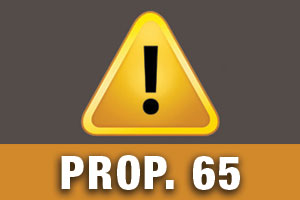A preliminary state proposal to drastically reduce a 25-year-old safe harbor standard for lead in consumer products has no scientific basis and is likely to lead to unnecessary warnings, the California Chamber of Commerce and an 82-member coalition is arguing.
The CalChamber and coalition made that argument in a comment letter submitted to the state Office of Environmental Health Hazard Assessment (OEHHA) on a “pre-regulatory” proposal to change the safe harbor level for lead.
The broad-based coalition has been actively engaged in the pre-regulatory process and includes California-based and national organizations and businesses of varying sizes that represent nearly every major business sector that would be directly affected by OEHHA’s proposal.
The coalition participated in the pre-regulatory workshop on the Maximum Allowable Dose Level (MADL) for lead on October 14 in Sacramento.
Response to Petition, Beech-Nut Case
OEHHA’s MADL proposal, one of several pending in the regulatory pipeline, is nominally in response to a request by the Center for Environmental Health (CEH) that OEHHA rescind the safe harbor level for lead and establish a new, much lower one. The current safe harbor level for lead, established by OEHHA’s predecessor agency in 1989, is 0.5 micrograms/day.
But OEHHA’s proposal addresses issues well beyond the scope of CEH’s request and instead seeks to undermine the 2015 appellate court ruling in Environmental Law Foundation v. Beech-Nut, et al. In that case, the appellate court ruled that fruit and fruit juice products did not require Proposition 65 warnings for lead exposure.
Among other things, the Beech-Nut court found that it is scientifically appropriate to average levels of product use over multiple days to estimate exposure levels to lead when making a decision about whether to provide a warning. Specifically, the court permitted higher levels of exposure when there are intervening days of no exposure (in this case, the average consumer ate peaches only once every two weeks).
Proposal Worsens Proposition 65 Climate
First, OEHHA has proposed to significantly lower the MADL at which a warning is required for lead. The proposal would slash the current level of 0.5 micrograms/day to 0.2 micrograms/day.
Acknowledging the Beech-Nut ruling, OEHHA would permit higher levels when there are intervening days of no exposure, but would set these levels 60% lower than permitted by the Beech-Nut court.
Proposition 65 already has an extraordinarily conservative safety factor built into the statute, which makes the current lead MADL the most conservative in the world. OEHHA’s proposal is not necessary to protect public health, and will result in a proliferation of new warnings in a state that already has a reputation for “overwarning.”
Second, OEHHA has proposed that the MADLs for 35 other reproductive toxicants will now be considered single-day limits such that exposures to these chemicals cannot be averaged over periods longer than one day (for example, if the average consumer consumed a product only once every two weeks).
This proposal fundamentally undermines science demonstrating that, like lead, different reproductive toxicants act differently over time. This proposal would require businesses to make extraordinarily conservative and baseless presumptions when making warning decisions, thus requiring warnings in many instances where they are not required today.
Additional Concern
Both before and during the October 14 workshop on the draft proposal, the coalition requested a brief extension of time to provide comments. In particular, the coalition pointed out that OEHHA had posted the data used to run the modeling on the afternoon of October 13—less than 24 hours before the workshop.
OEHHA rejected the coalition’s request for an extension, citing the need to move quickly in light of ongoing litigation.
The coalition is concerned that OEHHA has not provided sufficient time for the coalition to comment on this highly technical proposal.
Thus, should OEHHA decide, after reviewing the comments it receives, that it intends to proceed with this proposal, or some version of it, the coalition requests that OEHHA permit the coalition to submit additional comments, and that OEHHA consider any such additional comments before issuing any formal regulatory proposal.
Staff Contact: Anthony Samson

